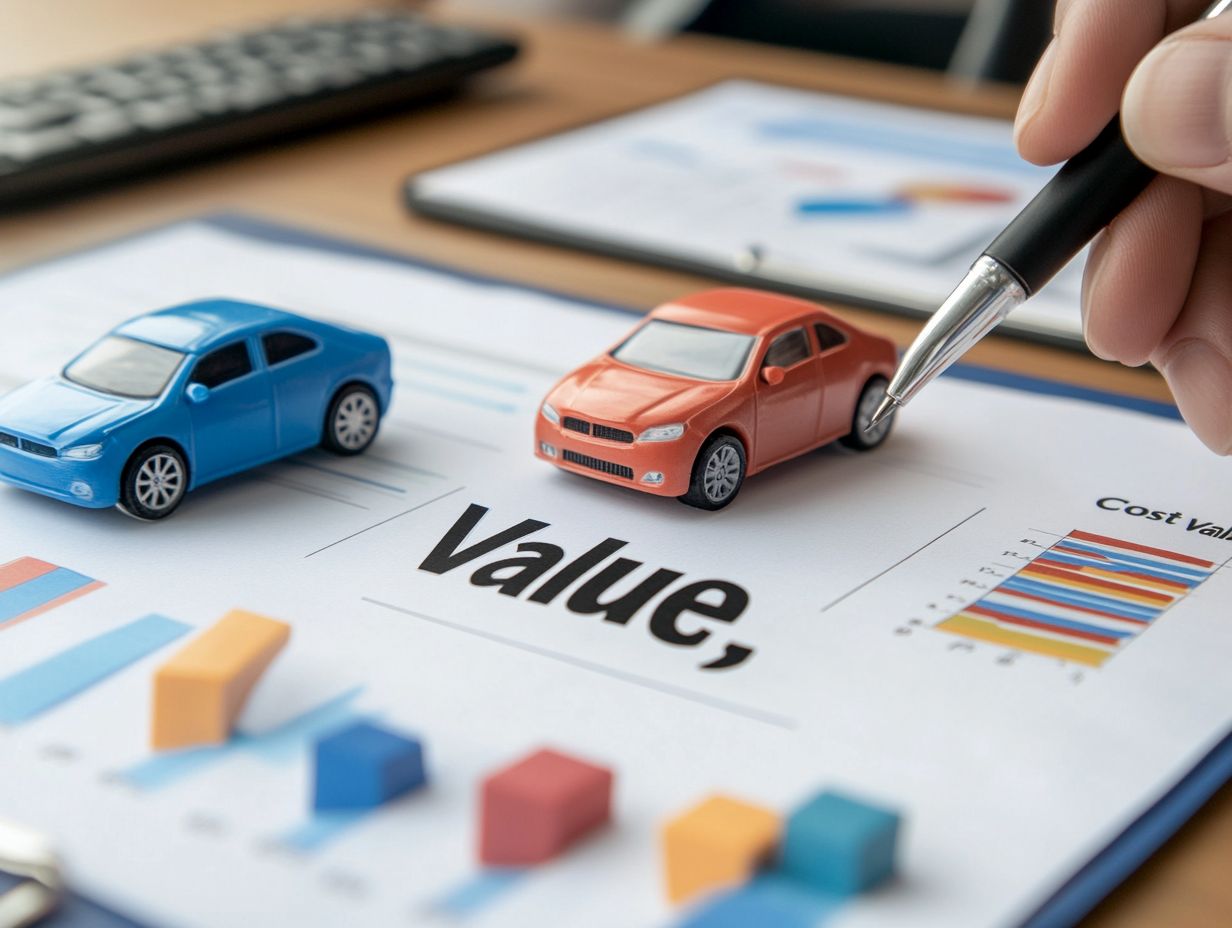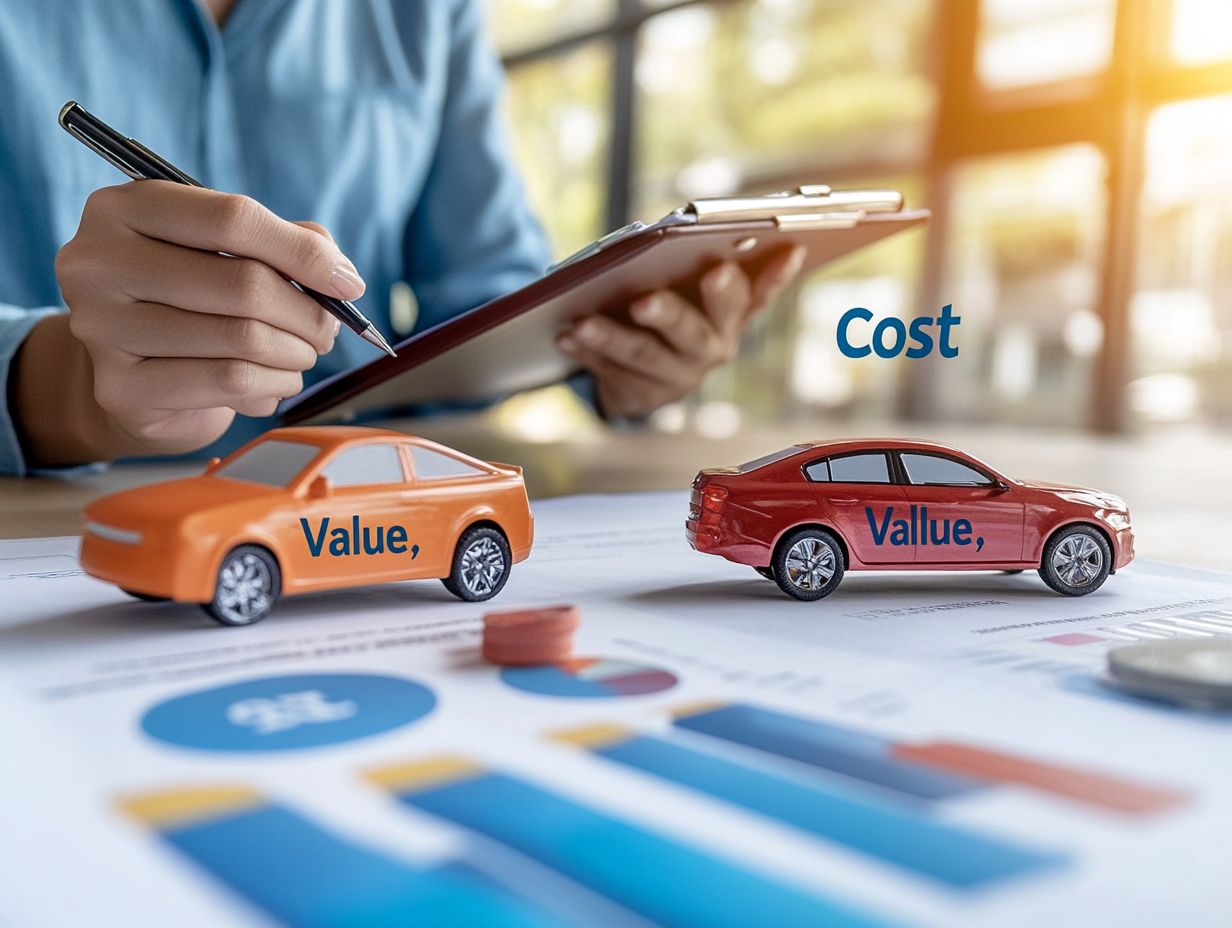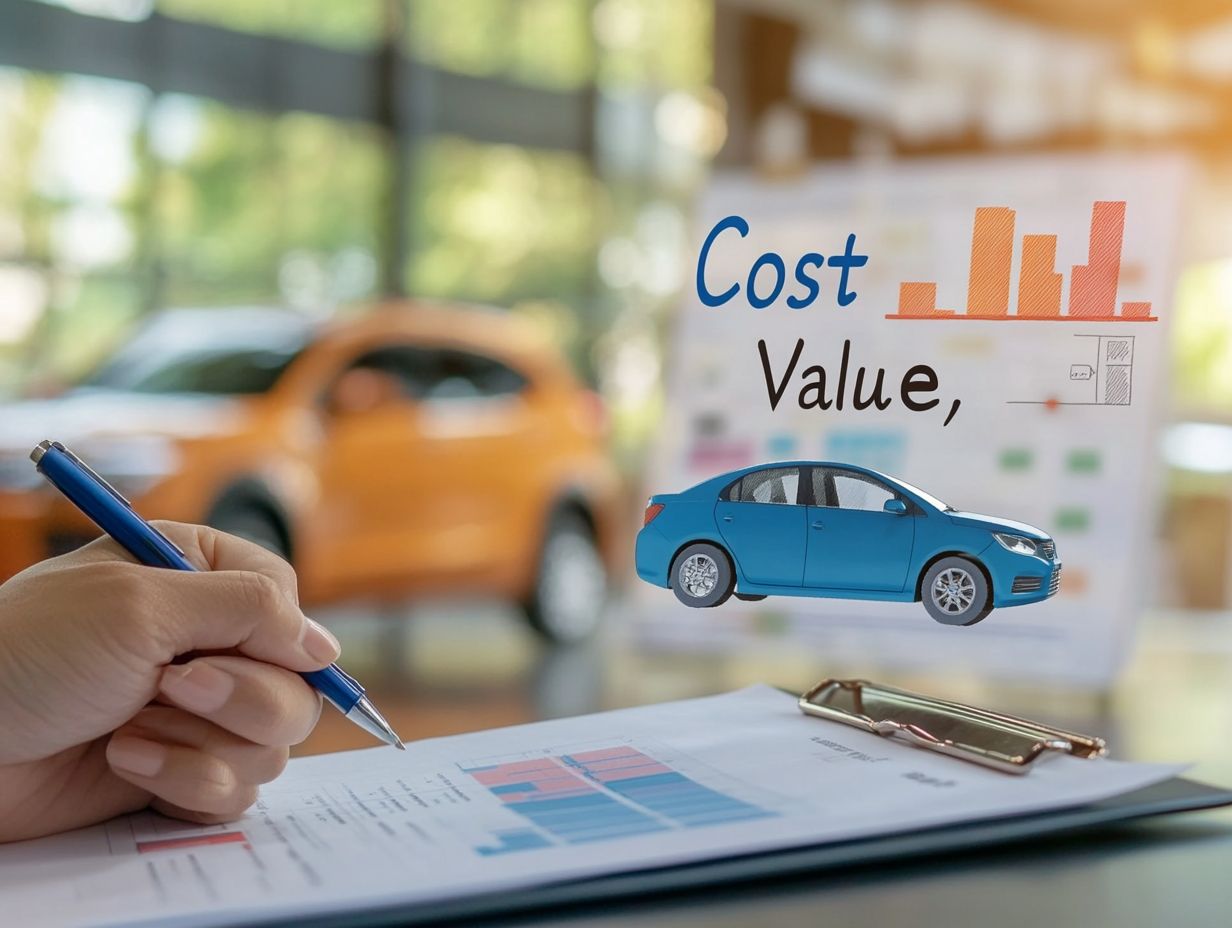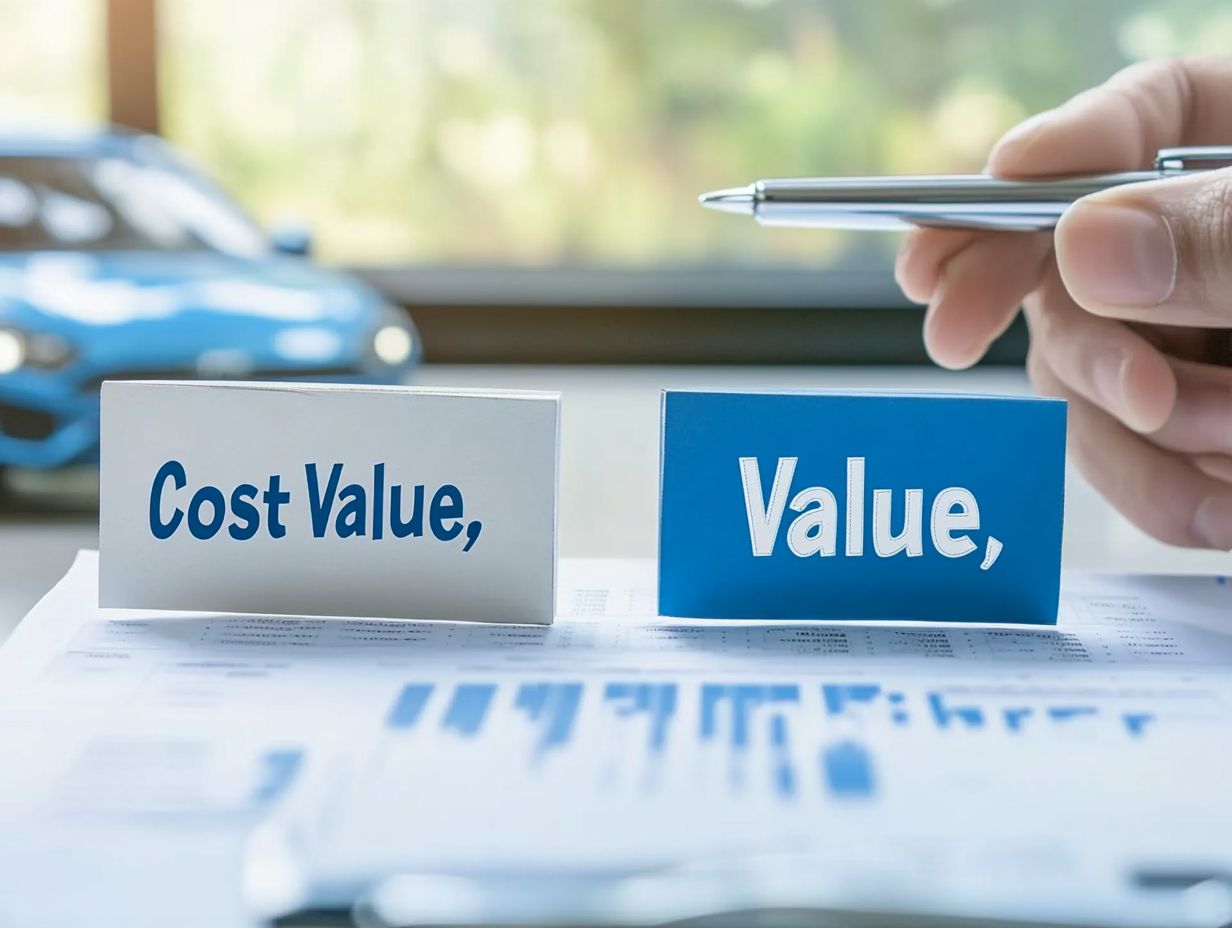Analyzing Cost vs. Value in Car Comparisons
When choosing the right car, grasping the distinction between cost and value is essential. It s important to consider ongoing expenses such as maintenance and resale value.
In this breakdown, we dive into the key factors involved in analyzing cost and value. We offer practical tips for gathering relevant data and showcase real-life examples to aid in your decision-making process. Whether you re a first-time buyer or looking to upgrade, this guide will expertly steer you in the right direction.
Contents
- Key Takeaways:
- Understanding Cost vs. Value in Car Comparisons
- Factors to Consider in Cost vs. Value Analysis
- How to Conduct a Cost vs. Value Analysis
- Real Life Examples of Cost vs. Value in Car Comparisons
- Frequently Asked Questions
- What is the importance of analyzing cost vs. value in car comparisons?
- How do I determine the cost of a car?
- What factors should I consider when comparing the value of different cars?
- Is it better to choose a car with a lower initial cost or a higher resale value?
- How can I save money while still getting a high-value car?
- Why is it important to do thorough research when analyzing cost vs. value in car comparisons?
Key Takeaways:

- Cost and value are two important factors to consider when comparing cars.
- Consider initial cost, maintenance expenses, and resale value when analyzing.
- Gather data and make comparisons to conduct an effective analysis.
Understanding Cost vs. Value in Car Comparisons
Grasping the nuances between cost and value in car comparisons is essential for you, whether you’re a consumer, appraiser, or part of an automotive OEM. Cost typically refers to the monetary amount you spend to purchase a vehicle, while value encompasses the worth or utility you derive from it. For a deeper look, check out understanding car financing.
This can vary based on market data, vehicle features, and economic factors like depreciation the decrease in a vehicle’s value over time and maintenance costs. It’s crucial to understand this difference when evaluating vehicle appraisals and determining fair market value, particularly for used cars, electric vehicles, and classic models like the Chevelle or Mustang.
Defining Cost and Value
Defining cost and value in the realm of vehicle appraisals is essential for you as a consumer looking to grasp your options. Cost generally pertains to the monetary amount needed to purchase or repair a vehicle, while value reflects the worth of that vehicle, influenced by various factors such as condition, demand, and features.
This distinction becomes particularly important when evaluating both new and used vehicles. Different types of vehicles like sedans, SUVs, and trucks carry varying costs, dictated by market trends and availability.
Features such as fuel efficiency, advanced safety systems, and technology integration can significantly enhance perceived value, making you more inclined to invest. For anyone navigating the car market, understanding these dynamics is crucial for making informed decisions.
Factors to Consider in Cost vs. Value Analysis
When you analyze the cost versus value of a vehicle, a multitude of factors come into play that can profoundly impact your overall assessment. These include the initial purchase price, ongoing maintenance expenses, and understanding how to compare resale values of cars.
Grasping these elements is essential for you, especially when navigating the choices between electric and gasoline vehicles. This understanding allows you to evaluate your options thoughtfully, considering factors like the vehicle s age, condition, and any market fluctuations that may come into play.
Initial Cost

The initial cost of a vehicle is often a pivotal factor in your decision-making process, encompassing the upfront amount you ll pay to acquire it. This figure typically comprises the purchase price, which is the amount you negotiate with the seller, along with additional charges such as sales tax, registration fees, and any applicable dealer fees.
Understanding how these components contribute to the total purchase price can enable you to align your budget with your expectations. It s crucial to consider the fair market value to determine if the initial cost truly reflects the vehicle s worth. Consider the total cost of ownership, which includes ongoing expenses like insurance, maintenance, and fuel.
In this context, a thorough vehicle appraisal becomes essential for making informed decisions that go beyond that initial expenditure.
Maintenance and Repair Costs
Maintenance and repair costs are essential factors to keep in mind when evaluating a vehicle’s long-term value. They can significantly affect your total cost of ownership over time.
As your vehicle ages, these costs tend to rise due to increased wear and tear. This leads to more frequent servicing and repairs. For example, while advanced technology and safety features may initially boost a vehicle’s appeal, their complexity can result in higher repair expenses as the years go by.
Being aware of your insurance coverage options is crucial. Insurance that covers repair costs can serve as a safeguard against financial setbacks. Get to know these variables! They can help you make smarter decisions in the market.
Resale Value
Resale value is an essential consideration in vehicle ownership. It reflects the potential return on your investment when it s time to sell.
This value is influenced by various factors, including market data and vehicle depreciation, which is the decrease in a vehicle’s value over time due to age and wear.
It s important for you to grasp how this value shifts based on initial costs. Vehicles bought at a higher price may not guarantee a proportional return when you decide to sell. Market trends play a pivotal role here. Fluctuations in demand and changes in consumer preferences can significantly affect resale figures.
By analyzing comparable listings, you can uncover valuable insights into competitive pricing strategies. This allows you to set realistic expectations for potential buyers. Ultimately, understanding the interplay between these variables will enable you to make informed choices when navigating the market.
How to Conduct a Cost vs. Value Analysis
Conducting a thorough cost vs. value analysis requires careful gathering of information, market trend analysis, and comparing car features against prices tailored to your specific needs for vehicle appraisal.
Gathering Data and Making Comparisons

Gathering data and making effective comparisons is crucial for an accurate cost vs. value analysis. This process enables you to evaluate multiple options based on reliable market data.
To conduct a thorough evaluation, you should collect various types of data, including recent sales figures, current market conditions, and comparable listings in similar categories. This detailed information helps you recognize pricing trends and pinpoint discrepancies in value.
By interpreting these insights, you can make informed decisions about price adjustments, ensuring your choices align with prevailing market standards.
Understanding this data helps you negotiate better, ensuring that your final decisions reflect not just your personal preferences but also an objective assessment of the market landscape.
Real Life Examples of Cost vs. Value in Car Comparisons
Real-life examples of cost versus value analysis in car comparisons illuminate the practical implications of these concepts, especially when evaluating the true cost of a new car.
Various case studies highlight the significance of accurate vehicle appraisals and appraisal services. They demonstrate how these factors can impact your decision-making process.
Case Studies and Examples
Case studies offer compelling examples of how cost versus value analysis can shift depending on the type of vehicle. For instance, comparing costs: leasing vs. buying a car provides insights drawn from appraisals and market data that enrich this understanding.
Take, for instance, the auction results of luxury SUVs. Here, you ll notice a complex interplay between initial purchase price and resale value. This is often swayed by factors like brand perception and maintenance history.
On the other hand, older classic cars reveal a fascinating truth: restoration efforts can substantially inflate perceived value, even when the original cost was quite modest.
In the commercial vehicle sector, you’ll encounter a different dynamic altogether, where utility and mileage become pivotal in establishing value at auction. These case studies not only highlight the intricacies of cost versus value but also illuminate broader market trends and consumer behavior across various segments.
Ready to analyze your vehicle’s value? Let’s get started!
Using Cost vs. Value Analysis to Choose the Right Car
Cost vs. value analysis helps you make informed car choices that fit your needs.
By looking at not just the purchase price but also the long-term benefits, you can find the vehicles that offer the best overall value.
This approach lets you see through flashy promotions and focus on key factors like performance, fuel efficiency, and resale value.
Understanding how different car manufacturers implement varying pricing strategies helps you identify brands that truly deliver value, especially when considering the role of features in car comparisons, rather than relying solely on captivating marketing campaigns.
This method helps you navigate the complex automotive marketplace more effectively, ensuring your choices lead to both satisfaction and savings in the future.
Frequently Asked Questions

What is the importance of analyzing cost vs. value in car comparisons?
Analyzing cost vs. value in car comparisons allows consumers to make informed decisions about their car purchases. For instance, comparing resale value features in cars can help you drive away with the best value for your money!
How do I determine the cost of a car?
The cost of a car includes the initial purchase price and additional expenses like taxes, insurance, and maintenance fees.
What factors should I consider when comparing the value of different cars?
When comparing car values, consider factors like fuel efficiency, safety ratings, reliability, and features in compact cars.
Is it better to choose a car with a lower initial cost or a higher resale value?
It depends on what you need and prefer. If you plan on keeping the car for a long time, a lower initial cost may be more beneficial. However, if you plan on reselling the car in a few years, a higher resale value would be more advantageous.
How can I save money while still getting a high-value car?
One way to save money while still getting a high-value car is to consider purchasing a used car instead of a brand new one. Used cars often have a lower initial cost and can still provide similar value as a new car.
Why is it important to do thorough research when analyzing cost vs. value in car comparisons?
Thorough research allows you to fully understand the costs and benefits of different cars, enabling informed decisions that can save you money in the long run.
Start your car search today with the insights gained from this analysis!




